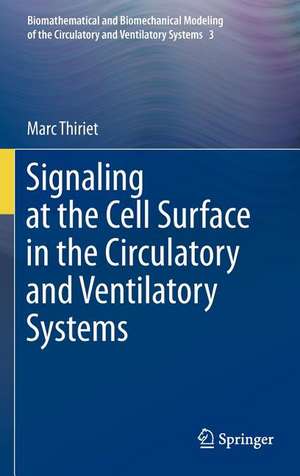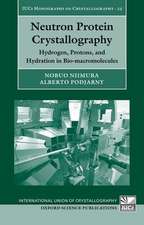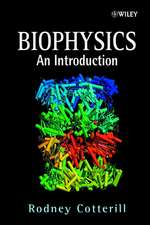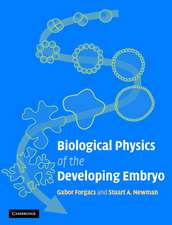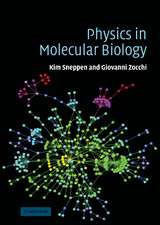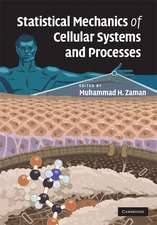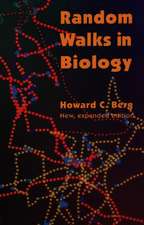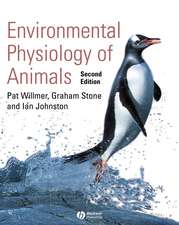Signaling at the Cell Surface in the Circulatory and Ventilatory Systems: Biomathematical and Biomechanical Modeling of the Circulatory and Ventilatory Systems, cartea 3
Autor Marc Thirieten Limba Engleză Hardback – 13 dec 2011
Volume 3 is devoted to the set of mediators of the cell surface, especially ion and molecular carriers and catalytic receptors that, once liganded and activated, initiate signal transduction pathways. Intracellular cascades of chemical reactions trigger the release of substances stored in cellular organelles and/or gene transcription and protein synthesis. Primary mediators are included in models of regulated cellular processes, but multiple secondary signaling components are discarded to allow simple, representative modeling and to manage their inverse problems.
| Toate formatele și edițiile | Preț | Express |
|---|---|---|
| Paperback (1) | 977.66 lei 6-8 săpt. | |
| Springer – 23 aug 2016 | 977.66 lei 6-8 săpt. | |
| Hardback (1) | 984.27 lei 6-8 săpt. | |
| Springer – 13 dec 2011 | 984.27 lei 6-8 săpt. |
Preț: 984.27 lei
Preț vechi: 1200.33 lei
-18% Nou
Puncte Express: 1476
Preț estimativ în valută:
188.39€ • 195.93$ • 157.87£
188.39€ • 195.93$ • 157.87£
Carte tipărită la comandă
Livrare economică 13-27 martie
Preluare comenzi: 021 569.72.76
Specificații
ISBN-13: 9781461419907
ISBN-10: 1461419905
Pagini: 1026
Ilustrații: XV, 982 p.
Dimensiuni: 155 x 235 x 61 mm
Greutate: 1.56 kg
Ediția:2012
Editura: Springer
Colecția Springer
Seria Biomathematical and Biomechanical Modeling of the Circulatory and Ventilatory Systems
Locul publicării:New York, NY, United States
ISBN-10: 1461419905
Pagini: 1026
Ilustrații: XV, 982 p.
Dimensiuni: 155 x 235 x 61 mm
Greutate: 1.56 kg
Ediția:2012
Editura: Springer
Colecția Springer
Seria Biomathematical and Biomechanical Modeling of the Circulatory and Ventilatory Systems
Locul publicării:New York, NY, United States
Public țintă
ResearchCuprins
Introduction.- 1. Signal Transduction.- 2. Ion Carriers.- 3. Main Sets of Ion Channels and Pumps.- 4. Transmembrane Compound Carriers.- 5. Receptors of Cell-Matrix Mass Transfer.- 6. Receptors.- 7. G-Protein-Coupled Receptors.- 8. Receptor Protein Kinases.- 9. Receptor Tyrosine Phosphatases.- 10. Morphogen Receptors.- 11. Receptors of the Immune System.- Concluding Remarks.
Textul de pe ultima copertă
The volumes in this authoritative series present a multidisciplinary approach to modeling and simulation of flows in the cardiovascular and ventilatory systems, especially multiscale modeling and coupled simulations. The cardiovascular and respiratory systems are tightly coupled, as their primary function is to supply oxygen to and remove carbon dioxide from the body's cells. Because physiological conduits have deformable and reactive walls, macroscopic flow behavior and prediction must be coupled to nano- and microscopic events in a corrector scheme of regulated mechanisms when the vessel lumen caliber varies markedly. Therefore, investigation of flows of blood and air in physiological conduits requires an understanding of the biology, chemistry, and physics of these systems together with the mathematical tools to describe their functioning.
Volume 3 is devoted to the set of mediators of the cell surface, especially ion and molecular carriers and catalytic receptors that, once liganded and activated, initiate signal transduction pathways. Intracellular cascades of chemical reactions trigger the release of substances stored in cellular organelles and/or gene transcription and protein synthesis. Primary mediators are included in models of regulated cellular processes, but multiple secondary signaling components are discarded to allow simple, representative modeling and to manage their inverse problems.
Reviews signaling pathways in the regulation of circulatory and respiratory function
Describes ion and molecular carriers and receptors
Integrates biology, chemistry, and physics for a multidisciplinary understanding of physiological flows
Volume 3 is devoted to the set of mediators of the cell surface, especially ion and molecular carriers and catalytic receptors that, once liganded and activated, initiate signal transduction pathways. Intracellular cascades of chemical reactions trigger the release of substances stored in cellular organelles and/or gene transcription and protein synthesis. Primary mediators are included in models of regulated cellular processes, but multiple secondary signaling components are discarded to allow simple, representative modeling and to manage their inverse problems.
Reviews signaling pathways in the regulation of circulatory and respiratory function
Describes ion and molecular carriers and receptors
Integrates biology, chemistry, and physics for a multidisciplinary understanding of physiological flows
Caracteristici
Reviews signaling pathways in the regulation of circulatory and respiratory function Describes ion and molecular carriers and receptors Integrates biology, chemistry, and physics for a multidisciplinary understanding of physiological flows Includes supplementary material: sn.pub/extras
